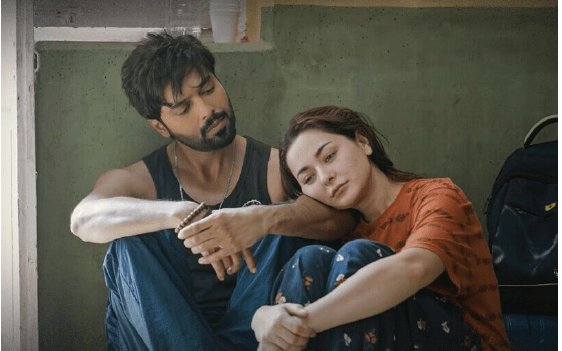The drama serial Kabhi Main Kabhi Tum, directed by Badar Mehmood and penned by the renowned Farhat Ishtiaq, is a compelling narrative that delves into profound social realities and rarely addressed societal issues. Featuring Fahad Mustafa and Hania Aamir in the lead roles as the protagonists while Emmad Irfani and Naeema Butt played the role of antagonists, delivering powerful performances. The legendary Bushra Ansari and Javed Sheikh, along with other talented supporting cast, further enrich the storyline with their nuanced portrayals.
This thought-provoking drama stands out for its brave exploration of topics often overlooked by mainstream media, shedding light on the complexities of human relationships and societal challenges.
First of all, this drama serial challenges the stereotypical notion that only women can be labeled as ‘gold diggers.’ With remarkable realism, it highlights that men, too, can exhibit greed and manipulate relationships – marrying or befriending wealthy women solely for their money and assets. The narrative powerfully conveys that the curse of materialism and worldly desires is not confined to a single gender.
Instead of fostering hatred toward Emmad Irfani and Naeema Butt for their roles as Adeel and Rubab Mansoor, the audience should applaud their compelling performances. Their portrayal brings to light an often-overlooked reality, encouraging viewers to reflect on the broader implications of greed and societal double standards.
This drama serial also dispels the misconception that women only suffer rights violations at the hands of men. Instead, it bravely sheds light on the uncomfortable reality that women, too, can become violators of other women’s rights. A prime example of this is Bushra Ansari’s role as the oppressive mother-in-law of Hania Aamir’s character: Sharejeena.
In many societies, the ongoing conflict between mothers in-law and daughters-in-law is a deeply ingrained issue, where one woman often infringes upon the rights of the other. These tensions typically occur within the privacy of the home, making them invisible to the broader public. The drama highlights how women can sometimes perpetuate the cycle of abuse, causing harm within their own gender. (In some cases, not all). Domestic violence, while often attributed to men, can involve women as instigators, leading to broken homes and shattered lives. Yet, in the end, the blame is frequently placed on men, overshadowing the role women can play in such conflicts. This series courageously brings this overlooked aspect of social reality to the forefront, as we can estimate from the unfair behaviour of Sharjeena’s mother-in-law with her.
It is a harsh reality that mothers who never inquire about their sons’ well-being before marriage, suddenly cling to them with such intensity after their wives arrive, as if their sons will belong only to them. Similarly, many girls who are loving daughters before marriage, transform into harsh and domineering daughters-in-law afterward. Once married, they believe their husband belongs solely to them, as though he is no longer a son or a brother to anyone else. This mindset creates problems and disagreements within the household. Eventually, these once-good daughters, who later become cruel daughters-in-law, may even drive a wedge between the son and his parents, or between a brother and his siblings, and so-called men who consider themselves as rational like Plato and Socrates and view women as irrational, ironically end up following the very footsteps of these so-called ‘irrational’ women. Dear Gentlemen! Where does your rationality go when you abandon your parents; Implementing decisions made by these same irrational women? And: Is this not a form of injustice by one woman against another? Yet, we are reluctant to bring this reality to light for the world to see.
Great respect for all the parents around the globe and I in advance apologise by highlighting that this drama also boldly unveils the bitter truth about how some parents tend to favour the child who possesses powerful degree, good job and bright future while humiliating the child who has nothing but empty hands. It highlights the reality of how, in many cases, parental love and support are often swayed by material success and social status.
Again I am really sorry but ‘Our society knows that religion teaches the rights of parents, but unfortunately, it has forgotten that our religion also teaches us to care for our children and uphold their rights as equal to those of the parents.’
I have highlighted the positive aspects of this drama, but there are also certain aspects that I strongly disagree with. As a journalist, as a daughter, and as a daughter-in-law, I vehemently oppose the portrayal of Sharjeena’s character. Unfortunately, in our society – and perhaps in any society around the world – daughters-in-law are not always as perfect as they are often depicted in Pakistani and Indian dramas. What is shown in these dramas, in my opinion, is somehow false representation. As daughters-in-law are not as helpless as they are often portrayed in these dramas, nor are mothers-in-law as cruel as shown. In the end, the drama effectively portrays the consequences of betraying relationships in the pursuit of arrogance, materialism, and worldly desires and showcases the rewards of humility, patience and respect for others especially close relationships as seen in the outcomes for Adeel, Mustafa, and Sharjeena.
The writer is our Editorial Assistant and journalist based in Peshawar.



